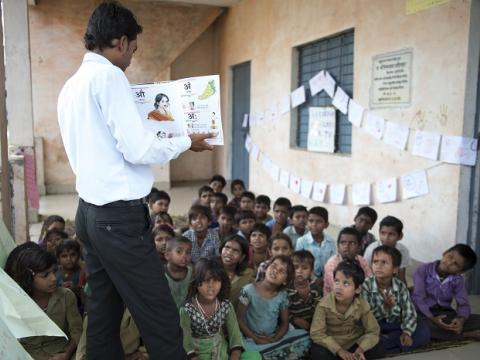Resolving to provide quality education to all children

The New Year has arrived, and with it a feeling that things can change; things will be better in 2016. Many people use this time to set resoultions: to exercise more, save money or eat healthier. However, only eight per cent of people are successful in keeping their New Year’s Resolutions. What if the global community only kept eight per cent of its “resolutions”?
The biggest resolutions of all
On January 1, the new Sustainable Development Goals (SDGs) were officially launched. The SDGs aim to pick up where the Millennium Development Goals (MDGs) left off with even more “resolutions” to eradicate poverty and injustice and reduce the effects of climate change.
Where the MDGs focused on providing children with access to school, the new SDG for education (Goal 4) focuses on access to inclusive and quality education. Along with a more ambitious and meaningful education goal, the SDGs include detailed targets set to position global actors to meet the goals successfully.
These global resolutions must be kept if we are to eradicate poverty and develop sustainably by 2030 – and keeping just eight per cent of these goals is unacceptable.
Education is the cornerstone of development
Educating children is critical to reducing poverty, and to achieving all other SDGs. Educated people enjoy better health (Goal 3), have more employment opportunities (Goal 8) and build safer and more sustainable societies (Goal 11). Through education we teach children to be peacebuilders (Goal 16) and advocates for the environment (Goal 13). Educated girls are empowered to get better jobs and make higher wages (Goal 5).
Let’s resolve to work together to educate all children
The most vulnerable children are the ones who missed out on the MDGs, and continue to see their education compromised due to factors like conflict, gender inequality and disability. We can’t build a world in which all children have learned the skills they need to succeed in school and life without a concerted effort by the global community and its leaders to appropriately measure and fund quality education programming.
These global resolutions must be kept if we are to eradicate poverty and develop sustainably by 2030.
As global citizens we must resolve to keep our governments accountable for their promises to children. As individuals we can resolve to become more aware of the issues facing the most vulnerable in their search for quality education. And finally, as parents, teachers and role models, let’s resolve to encourage the children in our lives to build a world where every girl and boy can access quality education.
Related links:
- The most important New Year’s Resolutions ever made
- Universal primary education was only the beginning: What the MDGs did and didn’t do for children’s learning
- Literacy Boost: Creating strong foundations for early grade learners
Linda Hiebert is the Senior Director, Education and Life Skills at World Vision International. She has over 25 years of experience in international development, including work as programme officer, director and vice-president in a number of countries and regions. Linda has a Bachelor's degree in Nursing, and a Master's degree in Development from Harvard's Kennedy School of Government.